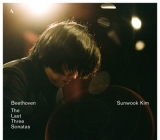 Ludwig van Beethoven: Klaviersonaten Nr. 30-32, op. 109-111; Sunwook Kim, Klavier; Accentus Music 1 CD ACC-30527 oder DVD ACC-20527 oder Blu-ray ACC10527; Aufnahme 07/2020, Veröffentlichung 23.04.2021 (74'09) – Rezension von Remy Franck
Ludwig van Beethoven: Klaviersonaten Nr. 30-32, op. 109-111; Sunwook Kim, Klavier; Accentus Music 1 CD ACC-30527 oder DVD ACC-20527 oder Blu-ray ACC10527; Aufnahme 07/2020, Veröffentlichung 23.04.2021 (74'09) – Rezension von Remy Franck
Das Kunstkraftwerk Leipzig war Schauplatz einer ganz besonderen Audio- und Videoproduktion von Accentus Music: Der heute 32-jährige koreanische Pianist Sunwook Kim spielte dort im Juli 2020 Ludwig van Beethovens drei letzte Klaviersonaten op. 109-111 in industrieller Umgebung, eingerahmt von diskreten Lichtprojektionen in der weiten Backsteinhalle. Diese Produktion wird gleichzeitig auf CD, DVD und Blu-ray veröffentlicht.
Kim liefert uns sehr gut durchdachte und schlüssig wirkende Interpretationen der drei Sonaten. Sein Spiel ist raffiniert und emotional, ohne je in Extreme zu verfallen, dabei auf Schönklang aus, aber auch stets lebendig. Die Interpretationen sind von einer derartigen Musikalität, dass sie der Hörer zusammen mit dem Pianisten voll erlebt.
In der Sonate op. 109 sagt der Komponist in meist weniger, hier etwas mehr als 20 Minuten alles, was zu sagen ist. Mit thematischen Verflechtungen erreicht er gewissermaßen eine Synthese seiner eigenen Kunst und eine Synthese des menschlichen Hoffnungsgedankens. Die Sonate beginnt, als wäre sie schon längst begonnen und sie endet, als wäre sie längst nicht fertig. Sunwook Kim kann das Endgültige und das Unendliche dieser Sonate zwar nicht so zwingend vereinen wie Alfred Brendel, aber er weiß doch definitiv sehr viel zu sagen.
Auch in den beiden anderen Sonaten ist Kim im Tempo etwas langsamer als viele Kollegen, aber er kann die Spannung ständig aufrechterhalten und uns in einem Gefühl von Richtigkeit am Innenleben der Sonaten teilnehmen lassen.
Den Gefühlsverwirrungen, den Abgründen menschlichen Alleinseins wird im Opus 110 die Entschlossenheit einer Kraft entgegengesetzt, die aus den Problemen herausführen soll.
Der konfliktreiche erste Satz des Opus 111 wird von Kim gefühlsgeladen und erregt dargestellt. Das innere Drama und die innere Zerrissenheit werden einmal mehr in der sehr emotional aufgebauten und über 20 Minuten langen Arietta vollends deutlich, die auch schon mal fast jazzig-tänzerisch aufrauschen kann, um dann in verinnerlichter Ratlosigkeit neue Kräfte zu sammeln.
Die Kameraführung von Ute Feudel harmoniert sehr gut mit der Musik und bietet eine Fülle interessanter Bildeinstellungen. Nicht weniger hervorragend ist der Klavierklang, den Vilius Keras und Toni Schlesinger mit optimaler Balance zwischen Direktheit und Räumlichkeit eingefangen haben.
The Kunstkraftwerk Leipzig was the setting for a very special audio and video production by Accentus Music: the now 32-year-old Korean pianist Sunwook Kim played Ludwig van Beethoven’s last three piano sonatas op. 109-111 there in July 2020. For his recital, the industrial location, a wide brick hall, was illuminated by discrete light projections. This production will be released simultaneously on CD, DVD and Blu-ray.
Kim delivers very well thought out and coherent interpretations of the three sonatas. His playing is refined and emotional without ever lapsing into extremes, always lively and aiming for beautiful sound. The interpretations are of such musicality that the listener experiences them fully together with the pianist.
In the Sonata op. 109, the composer says everything that needs to be said in usually less, here a little more than 20 minutes. With thematic interweaving, he achieves a synthesis of his art and a synthesis of the human idea of hope. The sonata begins as if it had already begun, and it ends as if it were far from finished. Sunwook Kim may not be able to unite the final and the infinite of this sonata as compellingly as Alfred Brendel, but he definitely has to say something.
Kim uses also a slower tempo than many colleagues in the other two sonatas, but he is able to constantly maintain the tension and let us participate in the inner life of the sonatas. His interpretations have a convincing sense of rightness.
The confusions of feeling, the abysses of human aloneness, are countered in Opus 110 by the determination of a force thriving to lead out of problems.
The conflicted first movement of Opus 111 is emotionally charged and agitated. The inner drama and turmoil once again become fully apparent in the Arietta, which is over 20 minutes long and can also at times rush up in an almost jazzy, ragtime-like manner, only to then look for new strength in an interiorized helplessness.
The camera work by Ute Feudel harmonizes very well with the music and offers many interesting angles. No less outstanding is the piano sound, which Vilius Keras and Toni Schlesinger have captured with an optimal balance between directness and spatiality.
























